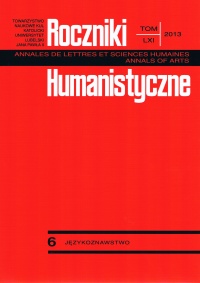The Metatextual and Intertextual Dimension of the Motto from The New Athens by Benedykt Chmielowski, as Used in The Emperor by Ryszard Kapuściński
Abstract
The article discusses the metatextual and intertextual dimension of one of the mottos for The Emperor by Ryszard Kapuściński, which is a quote from The New Athens by Benedykt Chmielowski. The latter was the first Polish encyclopaedia, which was highly undervalued by traditional authorities in the field of literary history, for it failed to meet the intellectual standards of the Enlightenment and was marked with the anachronistic mentality of the Saxon times. The analysis relates to the way in which Chmielowski’s motto provides an interpretative frame for the controversial book by Kapuściński, devoted to the decline and fall of the oldest African Empire – Ethiopia – in the 1960s and 1970s. The author of the paper’s main focus falls on the relationship between the meaning of the source text and the semantics of modern reportage, the role played by the popular image of Benedykt Chmielowski in the process of interpretation, the relationship between the quote and the archaic style of The Emperor, and the ways in which the quote from The New Athens interacts with the other mottos of the book – the multiplicity of which signals a new narrative strategy used by the reporter and writer.
References
Barthes R.: Śmierć autora, „Teksty Drugie” 1999, nr 1/2, s. 247-251.
Chmielowski B.: Nowe Ateny albo akademia wszelkiej sciencyji pełna, Kraków 1968. Chrzanowski I.: Historia literatury niepodległej Polski (965-1795), Warszawa 1971.
Fras J.: O języku „Cesarza” Ryszarda Kapuścińskiego, „Język Polski” 61(1981), s. 255-258. Głowiński M.:0 intertekstualności, „Pamiętnik Literacki” 77(1986), z. 4, s. 75-100. Horodecka M.: Zbieranie głosów. Sztuka opowiadania Ryszarda Kapuścińskiego, Gdańsk 2010.
Kapuściński R.: Cesarz, Warszawa 1999.
Kapuściński R.: Parabola władzy, w: Cesarz. Postscriptum, Zbigniew Zapasiewicz czyta „Cesarza” Ryszarda Kapuścińskiego, red. B. Dudko, M. Szczygieł, Warszawa 2008, s. 5-13. Lipscy M. i J.: Prezentacja autora, w: Benedykt Chmielowski, Nowe Ateny albo akademia wszelkiej sciencyji pełna, Kraków 1968, s. 5-10.
Nowacka B., Ziątek Z.: Ryszard Kapuściński. Biografia pisarza, Kraków 2008.
Piechota M.: Motto w dziele literackim. Rekonesans, w: Autorów i wydawców dialogi z czytelnikami. Studia historycznoliterackie, red. R. Ocieczek, Katowice 1992, s. 104-121.
Puzynina J.: Lingwistyka a rozumienie tekstu, w: taż, Słowo - wartość - kultura, Lublin 1997, s. 39-51.
Skubalanka T.: Stylizacja, intertekstualność, w: T. Skubalanka, Podstawy analizy stylistycznej, rozważania o metodzie, Lublin 2002, s. 179-208.
Skwarczyńska S.: Wstęp do nauki o literaturze, t. I, Warszawa 1954.
Sławiński J.: Intertekstualność, w: Słownik terminów literackich, red. M. Głowiński, T. Kostkiewiczowa, A. Okopień-Sławińska, J. Sławiński, Wrocław: Ossolineum 2010, s. 218-219.
Sławiński J.: Motto, w: Słownik terminów literackich, red. M. Głowiński, T. Kostkiewiczowa, A. Okopień-Sławińska, J. Sławiński, Wrocław: Ossolineum 2010, s. 325.
Sławiński J.: Poststrukturalizm, w: Słownik terminów literackich, red. M. Głowiński, T. Kostkiewiczowa, A. Okopień-Sławińska, J. Sławiński, Wrocław: Ossolineum 2010, s. 414-415.
Szpakowska M.: Saskie ostatki cesarza, „Twórczość” 1979, nr 6, s. 106-110.
Witosz B.: Metatekst - w opisie teoriotekstowym, stylistycznym i pragmalingwistycznym, w: Stylistyka a pragmatyka, red. B. Witosz, Katowice 2001, s. 73-81.
Wyrwas K., Sujkowska-Sobisz K.: Mały słownik terminów teorii tekstu, Kraków 2005.
Copyright (c) 2013 Roczniki Humanistyczne

This work is licensed under a Creative Commons Attribution-NonCommercial-NoDerivatives 4.0 International License.





